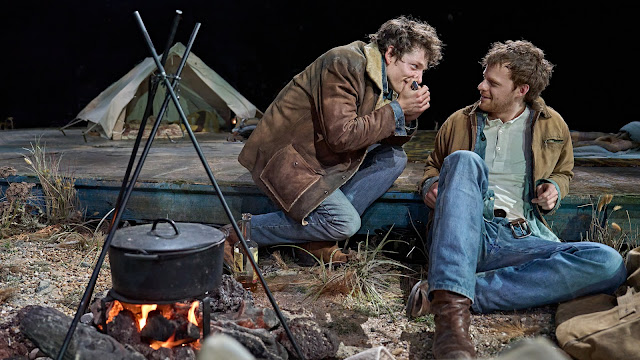 |
| Stuart Hughes and Mike Ross in True West (All photos by Cylla von Tiedemann) |
Caution: Spoilers are included.
True West by Sam Shepard is considered one of the great American plays reflecting the country’s changing idealism in the late 1970s. For the playwright, you could say the American Dream never existed in the first place, especially with Shepard having struggled with the family farm and a father who drank too much. Shepard’s life is perhaps best seen as one that was, paraphrasing Richard Gilman on the movie American Graffiti, “only tougher, shrewder, more seeded with intimations of catastrophe in the midst of swagger.” True West, written in 1980, was Shepard’s seventh play and it’s considered a work that intentionally looks at the clash of one idealistic man against his wayward, independent brother. The dramatic conceit is to use the strained relationship of two brothers, Austin and Lee, as a political and social device offering Shepard’s commentary on the false underpinnings of American culture. After seeing True West you immediately see the author’s disenchantment. It’s an edgy play that wears its political heart on its proverbial sleeve.
Toronto’s Soulpepper production, which opened April 3rd, is adorned with that edginess from start to finish. Right from the opening lines to the dramatic standoff between the brothers, played by Stuart Hughes (Lee) and Mike Ross (Austin), the masculine swagger rarely lets up. On this point, director Nancy Palk and the cast understand Shepard, his point-of-view and his social commentary. It’s also a production that easily finds the black humour of the playwright, which is almost absurdist in its evolution during the course of the play’s 90-plus minutes. Stuart Hughes is marvellous as Lee, the older, pragmatic and slightly reckless brother. Austin is the younger, straight-laced member of the family who’s working on a screenplay for a Hollywood movie. He’s left the distractions of Los Angeles and settled into his mother’s suburban house in central California. She’s on vacation in Alaska asking her youngest son to look after the plants while she’s away. Lee shows up, unexpectedly, after spending a long time in the desert. “I been spendin’ a lot a time on the desert…had me a Pit Bull there for a while but I lost him.” He barely accounts for himself in the story and his vagueness adds colour to his mysterious character.


















